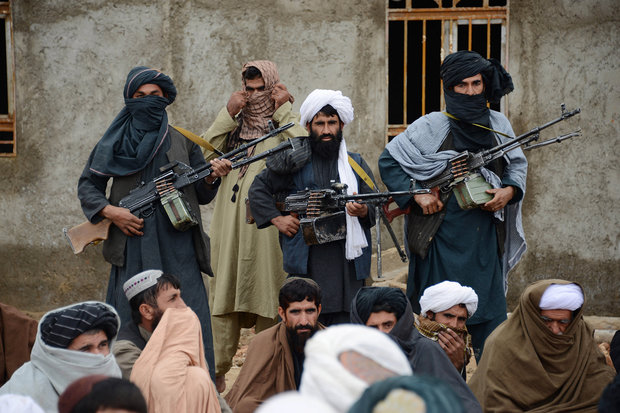Alice Wells, Donald Trump’s Principal Deputy Assistant Secretary for South and Central Asia and Mullah Sher Mohammad Abbas Stanekzai, the head of Taliban's political bureau in Qatar, represented their sides in the talks, reports said.
The top US military commander in Afghanistan, Gen. John Nicholson confirmed that the talks were held with “mid-level, senior-level Taliban leaders”, adding that some international organizations, foreign governments and other interested parties were also involved. Ihsanullah Tahiri, spokesman for Afghan High Peace Council (HPC), a government body tasked with exploring channels of communication with the Taliban, also admitted that they had “knowledge of the meeting” but added that “its purpose was not to start direct US-Taliban talks”.
While the ‘talks’ have been reported widely, it is still not clear who the US officials talked to. According to the Taliban spokesperson Zabiullah Mujahid, Nicholson’s remarks are a “baseless claim” to divert attention from America’s failures in Afghanistan and Trump’s failed strategy. He categorically rejected reports that Taliban’s political office in Qatar held talks with the US officials.
Like the protracted US war in Afghanistan, which has entered its 17th year, this issue is also shrouded in mystery. Last week there were reports that the Afghan government, on the instructions of the US authorities, had evacuated more than 150 ISIS fighters from northern Afghanistan. In Yemen, the Saudi-UAE coalition, with logistical and military support from the US, has been recruiting Al-Qaeda fighters against the Houthi rebels. So, it should not come as a surprise if the US officials actually talk to the Taliban and agree to make them part of the government in Kabul.
As seasoned experts have argued, the talks between the US officials and the Taliban representatives, if they really took place, would seriously undermine the credibility of the Afghan government led by President Ashraf Ghani. According to reports, during the talks between the two sides, no representative from the Afghan government was present, which makes the whole exercise futile.
Even Ryan Crocker, the former US envoy to Afghanistan, remarked that these talks would delegitimize the Afghan government, which has already been pushed on the back-foot. “This may lead somewhere, but I don't think it's going to lead anywhere good for the Afghan government itself,” he said. Crocker’s views have been echoed by many veterans and observers in the US and Afghanistan.
The US government had earlier maintained that it will support the Afghan-led and Afghan-owned peace process with the Taliban because the people of Afghanistan have given mandate to the government in Kabul, not Washington. The volte-face of the US in this case is not particularly surprising since the hawks in Washington are known to take unilateral, foolhardy decisions.
President Ashraf Ghani of Afghanistan has repeatedly stated that only an Afghan-led peace process could bring stability to the war-ravaged country. He has been vigorously wooing the Taliban to come to the negotiating table, even offering them political role in Kabul if agree to shun violence and accept the Afghan constitution. But the insurgent group has been adamant on negotiating only with the US.
The US-Taliban talks in Qatar have put Ashraf Ghani-led government in Kabul in a difficult position. By side-stepping the Kabul government and initiating direct talks with the insurgent group, Washington has shown utter disregard to President Ghani’s offer of Afghan-led talks with the Taliban. If these preliminary talks succeed, they could lead to direct negotiations between the Taliban and the US government, which means the Afghan government would be pushed to the sidelines.
Chris Kolenda, the US military veteran who had been part of talks with the Taliban during the Obama administration as well, told Daily Beast that the US representatives were able to “vigorously challenge” the viewpoints of Taliban representatives. “They said that if an inclusive government, after a political settlement occurs in Afghanistan, wants international forces to be in the country to train Afghan security forces, the Taliban said they would be OK with that, because they’ll have participated in that decision,” he said, suggesting that the U.S. government and the Taliban were looking for a ‘marriage of convenience’ in Afghanistan in future, raising another big question mark on America’s flawed Afghanistan policy and its so-called ‘war against terrorism’.
But will these talks produce the desirable results? Waheed Mozhdah, who served in the Taliban regime and is considered close to the top Taliban leadership, doesn’t think these talks would play well with the Taliban’s rank-and-file. Many of the hardcore Taliban warriors, Mozhdah believes, would never accept the presence of US troops or the US-backed government in Afghanistan.
So, whether the talks took place or not, there is very little likelihood of this longstanding war ending until the US-led forces withdraw from Afghanistan, which is the main demand of the Taliban. If the US is indeed serious in ending this war, the only way is the way out for them.
MNA/TT
